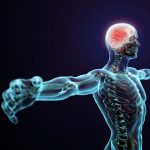
Céline Wessa reports on a recent systematic review of pharmacological anti-inflammatory treatment in children and adolescents with depressive symptoms, which has some promising results.
[read the full story...]
Céline Wessa reports on a recent systematic review of pharmacological anti-inflammatory treatment in children and adolescents with depressive symptoms, which has some promising results.
[read the full story...]
Athina Aruldass finds that management of serious neuropsychiatric disorders should acknowledge the importance of poor physical health and target restoration of both brain and body function.
[read the full story...]
Jonas Hagenberg discusses new insights into the possible use of proteomics (the large-scale study of proteins) for improving our prediction of depression remission.
[read the full story...]
Lorna Staines summarises a recent study on predicting treatment-resistant psychosis, which suggests that future risk prediction efforts should seek to consider routinely collected data.
[read the full story...]
Gerard Clarke explores a recent study which looks into the interplay of metabolome and gut microbiome in individuals with major depressive disorder.
[read the full story...]
In her debut blog, Fabiana Corsi-Zuelli summarises a recent systematic review and meta-analysis investigating the role of peripheral immune cells in depression, with a focus on implications for future immunotherapy trials.
[read the full story...]
Millie Lowther, Isabel Luetkenherm, Carlos Mena and Alexandra Pike summarise a recent fMRI meta-analysis, which finds that activation in brain circuits related to salience, interoception and emotional processing were found to predict a positive response to CBT in anxiety disorders.
[read the full story...]
This review of clinical tests for the diagnosis of the condition of the dental pulp included 28 studies from 29 publications. The quality of the included studies was low providing limited scientific evidence regarding the accuracy and reproducibility of diagnostic tests.
[read the full story...]
In her debut blog, Éimear Foley reviews a recent meta-analysis that identifies possible differences between people experiencing depression and healthy controls.
[read the full story...]
Alexandra Pike, Alexis An Yee Low and Jonathan Roiser critically appraise a recent n-of-1 study on ‘brain pacemakers for depression’, which received extensive press coverage earlier this month. The case study looks at deep brain stimulation (closed-loop neuromodulation) in an individual with treatment-resistant depression.
[read the full story...]